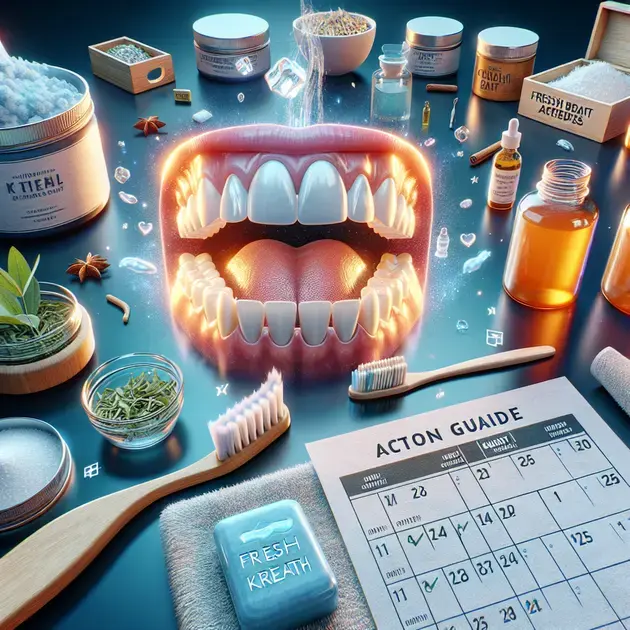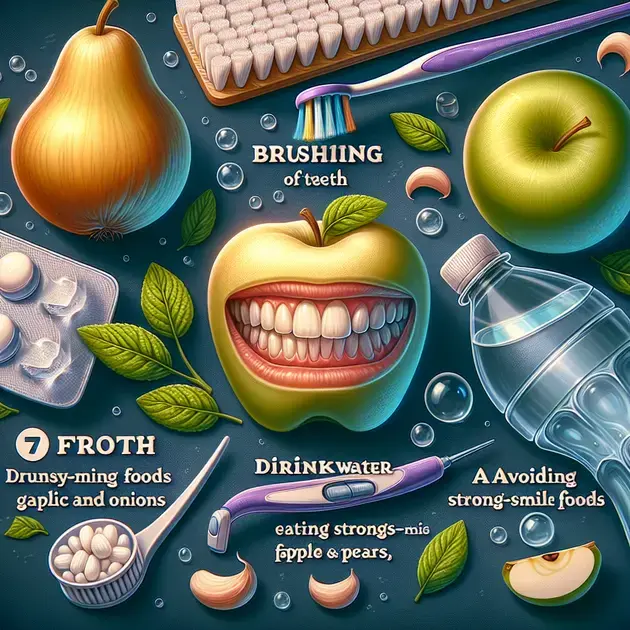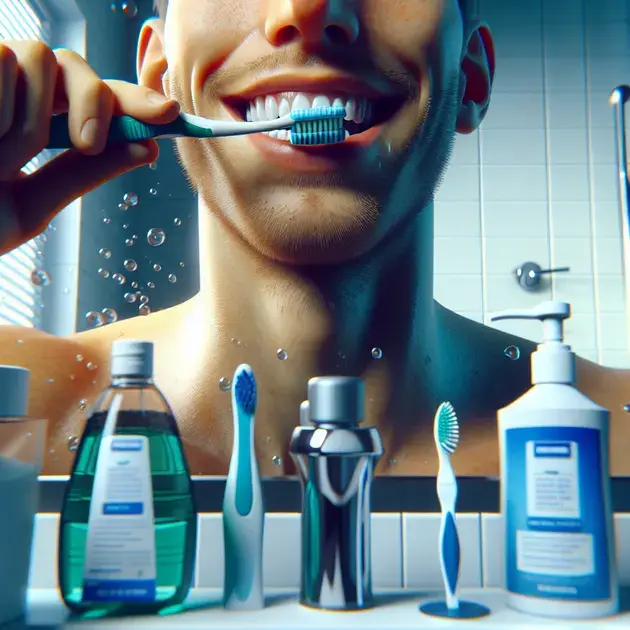Dealing with bad breath, also known as halitosis, can be a persistent and embarrassing issue for many individuals. It not only affects personal confidence but can also impact social interactions and relationships. Understanding the causes of bad breath is crucial in effectively addressing and managing this common concern.
Recent studies have shown that the most common causes of bad breath include poor oral hygiene, certain foods and drinks, smoking, dry mouth, and underlying health conditions. By addressing these factors and implementing proper oral care habits, individuals can significantly reduce the occurrence of bad breath and improve their overall oral health.

Causes of Bad Breath Explained
Bad breath, also known as halitosis, can have various causes. One common cause is poor oral hygiene, which can lead to bacteria buildup in the mouth. Other possible reasons include dry mouth, gum disease, smoking, certain foods, and medical conditions. To identify the specific cause of bad breath, it is essential to consult a dentist or healthcare provider. They can perform a thorough examination and recommend appropriate treatment.
If you suspect that your bad breath is related to a specific medical condition, such as sinus issues or diabetes, it is crucial to address the underlying problem. Using a tongue scraper, mouthwash, and maintaining a good oral hygiene routine can help combat bad breath caused by bacteria buildup. Additionally, staying hydrated and avoiding tobacco products can also improve the freshness of your breath.
One valuable resource for learning more about the causes of bad breath and how to address them is the website of the American Dental Association (ADA). The ADA offers comprehensive information on oral health topics, including halitosis. By visiting their website and reading their articles, you can gain valuable insights into maintaining fresh breath and overall oral health.
Step-by-Step Guide:
- Visit the ADA website at www.ada.org.
- Click on the “Oral Health” tab on the homepage.
- Look for the section on halitosis or bad breath.
- Read the articles and resources provided to understand the causes of bad breath.
- Implement recommended oral hygiene practices to reduce or eliminate bad breath.
Effective Strategies for Managing Halitosis
Managing halitosis effectively requires a combination of preventive measures and targeted treatments. One essential strategy is to brush your teeth at least twice a day and floss regularly to remove food particles and plaque that can contribute to bad breath. Using a tongue scraper to clean the surface of your tongue can also help eliminate odor-causing bacteria.
In addition to good oral hygiene practices, using a mouthwash specifically designed to combat bad breath can provide immediate relief. Opt for alcohol-free mouthwashes that contain antibacterial ingredients to target the root cause of halitosis. It is important to follow the instructions on the mouthwash label for optimal effectiveness.
Another effective strategy for managing halitosis is to maintain a balanced diet and stay hydrated. Drinking plenty of water throughout the day can help wash away bacteria and food particles that might cause bad breath. Avoiding strong-smelling foods like garlic and onions can also help keep your breath fresh.
Step-by-Step Guide:
- Purchase a tongue scraper and incorporate it into your daily oral hygiene routine.
- Select an alcohol-free mouthwash with antibacterial properties for combating bad breath.
- Follow the recommended usage instructions for the mouthwash, typically after brushing and flossing.
- Consume plenty of water and maintain a diet rich in fruits and vegetables to promote fresh breath.
- Avoid smoking and limit the consumption of foods known to cause bad breath.
Improving Oral Health to Combat Bad Breath
Improving your oral health is a key step in combating bad breath and maintaining overall well-being. A vital aspect of oral health is regular visits to the dentist for professional cleanings and check-ups. Your dentist can identify any underlying issues contributing to bad breath and recommend personalized solutions.
Developing a consistent oral hygiene routine that includes brushing, flossing, and using mouthwash is essential for preventing halitosis. Proper brushing technique, focusing on all surfaces of the teeth and tongue, can help remove bacteria and food debris that cause bad breath. Flossing helps clean between teeth where toothbrushes can’t reach.
Another effective way to improve oral health and combat bad breath is to incorporate antimicrobial mouthwashes or rinses into your daily routine. These products can help reduce the levels of bacteria in your mouth, leading to fresher breath. Look for mouthwashes that are approved by dental associations for their effectiveness.
Step-by-Step Guide:
- Schedule regular dental check-ups with a trusted dentist in your area.
- Establish a thorough oral hygiene routine, including brushing, flossing, and using mouthwash.
- Invest in a quality toothbrush and replace it every 3-4 months or as recommended by your dentist.
- Explore the use of antimicrobial mouthwashes to complement your oral care regimen.
- Follow any additional recommendations provided by your dental professional for improving oral health.

Understanding the Impact of Poor Oral Hygiene
Having poor oral hygiene can have a significant impact on your overall health and well-being. Not only can it lead to tooth decay and gum disease, but it can also contribute to other health issues such as heart disease and diabetes. When we neglect our oral health, bacteria build up in our mouths, leading to bad breath, cavities, and inflammation of the gums.
To prevent these issues, it is important to practice good oral hygiene habits. This includes brushing your teeth at least twice a day, flossing daily, and visiting your dentist regularly for check-ups and cleanings. By maintaining a proper oral care routine, you can reduce the risk of developing serious health problems associated with poor oral hygiene.
In addition to the physical health consequences, poor oral hygiene can also have social and emotional impacts. Bad breath, stained teeth, and visible cavities can affect your confidence and self-esteem, making it difficult to interact with others and feel comfortable in social situations.
Overall, the impact of poor oral hygiene goes beyond just the health of your teeth and gums. It can affect your overall quality of life and well-being. By taking care of your oral health, you can improve not only your physical health but also your self-confidence and social interactions.
Remember, your oral health is an important part of your overall health, and it is essential to prioritize good oral hygiene habits to prevent potential health issues in the future.
Simple Habits for Fresher Breath
Having fresh breath is not only important for your confidence and social interactions but also for your oral health. Bad breath, also known as halitosis, can be caused by poor oral hygiene, certain foods, or underlying health conditions. By incorporating simple habits into your daily routine, you can maintain fresher breath and improve your oral health.
One of the simplest habits for fresher breath is to brush your teeth and tongue at least twice a day. Brushing helps remove food particles and bacteria that can cause bad breath. Additionally, flossing daily can help remove plaque and debris from between your teeth, further reducing the risk of bad breath.
Drinking plenty of water throughout the day can also help keep your mouth hydrated and wash away food particles that can contribute to bad breath. Avoiding foods high in sugar and opting for a balanced diet rich in fruits and vegetables can also help maintain fresher breath and overall oral health.
Using mouthwash or chewing sugar-free gum can provide temporary relief from bad breath, but they should not be used as a substitute for proper oral hygiene habits. Remember to schedule regular dental check-ups and cleanings to address any underlying issues that may be contributing to bad breath.
By incorporating these simple habits into your daily routine, you can enjoy fresher breath, improved oral health, and increased confidence in social interactions.
Exploring Natural Remedies for Bad Breath
While maintaining good oral hygiene habits is crucial for preventing bad breath, there are also natural remedies that can help freshen your breath and promote overall oral health. Natural remedies are often gentle on the mouth and can be a great alternative to commercial products that may contain harsh chemicals.
One natural remedy for bad breath is oil pulling, an ancient practice that involves swishing oil around in your mouth to remove toxins and bacteria. Coconut oil is commonly used for oil pulling and has antimicrobial properties that can help combat bad breath-causing bacteria.
Another natural remedy is chewing on fresh herbs like parsley or mint after meals. These herbs contain chlorophyll, which can help neutralize odors in the mouth and freshen your breath naturally. Additionally, drinking green tea can help kill bacteria in the mouth and reduce the risk of bad breath.
Some essential oils, such as peppermint and tea tree oil, can be diluted in water and used as a mouth rinse to freshen breath and kill bacteria. These essential oils have antimicrobial properties that can help maintain a healthy balance of bacteria in the mouth.
By exploring natural remedies for bad breath and incorporating them into your daily routine, you can enjoy fresher breath, improved oral health, and the peace of mind that comes with using gentle, natural ingredients to care for your mouth.
Conclusion
Understanding the impact of poor oral hygiene is crucial for maintaining overall health and well-being. Poor oral hygiene not only leads to tooth decay and gum disease but can also contribute to serious health issues like heart disease and diabetes. By neglecting oral health, harmful bacteria accumulate in the mouth, causing bad breath, cavities, and gum inflammation.
To prevent these consequences, it’s essential to establish good oral hygiene habits such as brushing teeth twice daily, daily flossing, and regular dental check-ups. By following a proper oral care routine, individuals can significantly reduce the risk of developing health problems associated with poor oral hygiene, not limited to just teeth and gums but affecting the overall quality of life.
Poor oral hygiene doesn’t just impact physical health; it can also have social and emotional consequences. Bad breath, stained teeth, and visible cavities can dent one’s confidence and self-esteem, making social interactions uncomfortable. Prioritizing oral health care not only improves physical health but also boosts self-confidence and enhances social interactions, underscoring the importance of maintaining good oral hygiene habits for one’s overall well-being.

















